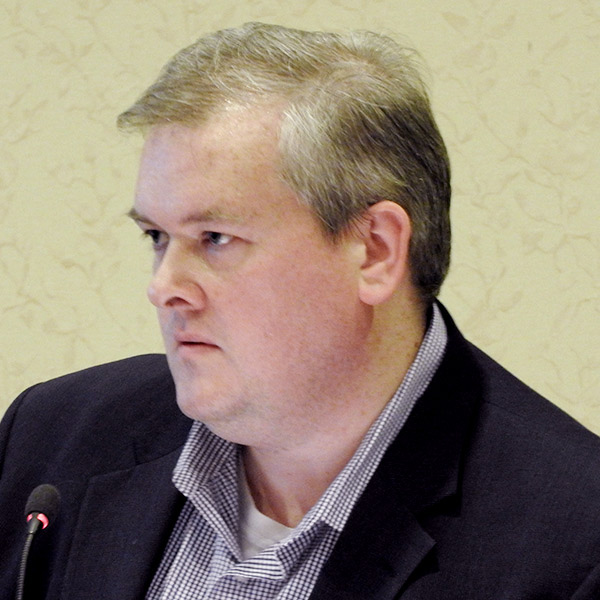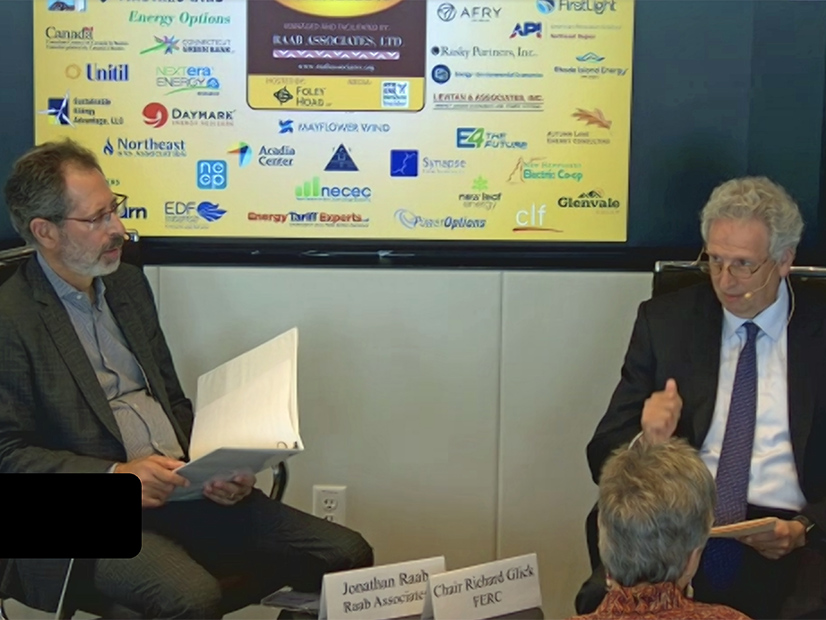Climate activists who cheered the failure of Sen. Joe Manchin’s proposal to ease the permitting of energy infrastructure projects are ignoring how the current rules are hobbling the expansion of renewable power, FERC Chairman Richard Glick said last week.
Glick told Raab Associates’ New England Electric Restructuring Roundtable in Boston Sept. 30 that he was meeting with a group of environmental justice advocates earlier in the week when it was announced that Manchin had pulled the bill from the Senate floor.
“They were all celebrating,” Glick said. “And I said to them, ‘You know, you can have differences of opinion about different provisions in the bill. But if your goal is to get more renewable energy on the grid, you’ve got to get more transmission built. … I think just to pretend that the status quo is working [is a mistake]. It’s not working.”
Manchin (D-W.V.) withdrew the permitting proposal from inclusion in a must-pass spending bill when it became clear he lacked the 60 votes needed for passage in the Senate — with substantial opposition among his fellow Democrats who saw it as a concession to the oil and gas industry that would undermine decarbonization efforts. Manchin vowed to continue seeking votes for the bill.
Glick said the federal government’s role in siting will likely increase as a result of the Infrastructure Investment and Jobs Act, which allows utilities to ask FERC to overrule state regulators’ rejection of a project.
The Manchin proposal would allow FERC to order construction of transmission designated as in the national interest if asked by a state or utility. It would also set a two-year target for the completion of environmental reviews and reduce the time community members have to file legal challenges. (See Manchin Details Proposal to Streamline Approval of Energy Projects.)
As he had earlier in regard to the siting authority in the IIJA, Glick continued to express skepticism that FERC will play a major role in settling siting disputes. (See Glick Aiming for Final Transmission Rule by End of Year.)
“Even if the federal government is given the authority that Sen. Manchin has proposed — FERC in particular — the states are going to continue to play [a major role], whether that be through siting other transmission lines or general ratemaking authority. Utilities aren’t going to want to cross their states very often. And so I think the states are going to continue to play a very important role no matter what happens with the Manchin bill.”
Matthew Nelson, chair of the Massachusetts Department of Public Utilities, who spoke with Glick in the first discussion of the Roundtable, said he welcomed a stronger federal role in transmission siting.
“I don’t think we’re going to get to our decarbonization goals without a big step forward that allows a big, well-researched project to be built. So I think having something like this — having a backstop authority — is going to be very, very important.”
State Role in Cost Allocation
Nelson also expressed support for FERC’s proposed requirement in its April Notice of Proposed Rulemaking (NOPR) that transmission providers seek the agreement of relevant state entities on cost allocation, with FERC imposing a solution if no agreement is reached (RM21-17). (See FERC Issues 1st Proposal out of Transmission Proceeding.)
“I do think that FERC kind of being the referee in the room will allow the conversations not to be, ‘It is either build this or not build this,’ but, ‘This is getting built, and what is the proper way to allocate the costs?’ I think that’s a much more productive conversation,” Nelson said. “… So I think that structure has a very good chance of being successful if properly implemented.”
 Matthew Nelson, chair of the Massachusetts Department of Public Utilities | © RTO Insider LLC
Matthew Nelson, chair of the Massachusetts Department of Public Utilities | © RTO Insider LLCAbe Silverman, general counsel for the New Jersey Board of Public Utilities, said FERC could help force agreements to share costs.
“We almost need the Sword of Damocles from FERC hanging over everyone’s head,” he said during the Roundtable’s second discussion. “We almost need that strong, proactive FERC, standing out there saying, ‘If you do not agree to a cost allocation, then we are going to impose one on you.’”
Roundtable moderator Jonathan Raab, who is also moderator for the Joint Federal-State Task Force on Electric Transmission, said he was surprised at the Task Force’s last meeting in July that “there seemed to be a groundswell of support to consider having FERC require some minimum transfer capacity capability” between regions. (See States Back FERC Interregional Transfer Requirement.)
“I think it’s an eminently reasonable idea,” said Nelson. “I think the more that we’ve looked at the way the grid is evolving, the more we need redundancy and reserves for multiple different reasons.”
Nelson said there are many technical questions regarding how to set such minimums. “But I really think it’s a solid idea … that could bring benefits to a lot of different regions when they don’t know they need it.”
Glick said there was “an enormous consensus” following the Texas outages during Winter Storm Uri that transfer capacity needed to be increased. But he said many issues are standing in the way, “not the least of which is who builds it and who pays for it.”
Future NOPR on Socializing Interconnection Costs?
Raab also noted that the task force discussed ways to change participant funding rules to socialize some interconnection costs, a proposal that was not included in the interconnection NOPR issued in June (RM22-14).
“It’s an issue that I feel very strongly about,” Glick responded. “We still have a lot of future NOPRs to come. So hopefully, we will address it.”
Glick said the current process does not allocate costs roughly commensurate with benefits, as required by court precedents.
“In many cases, you know, you have a bunch of wind generators coming in [and the] first one that comes online has to pay the cost of the network upgrade. Everyone else behind them doesn’t have to pay. That doesn’t seem fair, right?” Glick asked. “Secondly, there are a number of benefits that these upgrades provide, in addition to just allowing the generator or generators to hook up to the grid. And we’re not taking that into account.
“At the Task Force, not everyone was on the same page,” Glick said. “I think we have more work to do on it — maybe develop more of a record on it. But I’m very supportive. And I’m determined to address this issue.”
Nelson also expressed support for a change. “Having one person take the hit for everyone behind it worked in the day when there was one huge generator coming online, and maybe that required an upgrade. But I’m not sure that with a distributed generation market, that makes much sense,” he said.
Offshore Wind Transmission
Glick also said the commission is considering whether tariff changes are needed to allow PJM, NYISO or ISO-NE to develop offshore wind “collector” systems to minimize transmission costs and beach landings. “It would be foolish not to include those [state OSW] goals and mandates in our transmission planning processes,” he said.




